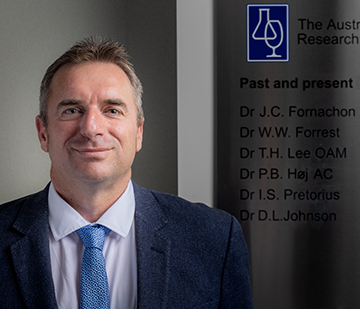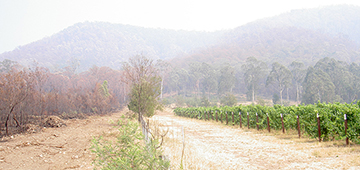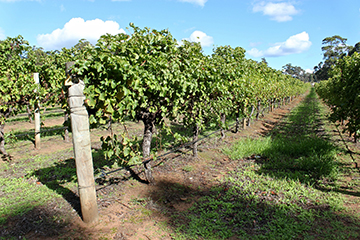27 March 2020 (updated 1 April 2020)
The current COVID-19 pandemic has led winemakers to seek advice on how to sanitise their wineries in the event that a staff member becomes infected or suspected of being infected.
The advice in this eBulletin refers to surfaces that an infected person might touch, cough or sneeze on (e.g. door handles, touch screens, keyboards, pump controls, tank lids, tank doors, catwalk handrails etc.) and should be read in conjunction with the Australian Grape & Wine Cleaning and Disinfection Guidelines.
Note that winery cleaning and sanitation of wine vessels, pumps, hoses and other ‘internal surfaces’ not normally touched can continue as usual, without modification.
SARS-CoV-2 is the novel coronavirus responsible for the disease known as COVID-19.
While SARS-CoV-2 is mainly spread from person to person via respiratory droplets produced when an infected person coughs or sneezes, these droplets containing the virus can land on surfaces. Consequently, transmission may be possible through contact with contaminated surfaces. Review of the literature and current research articles indicates that human coronaviruses can remain viable for hours to days on metal, glass or plastic surfaces (Kampf et al. 2020, van Doremalen et al. 2020).
Given the possibility of transmission of SARS-CoV-2 via surfaces, cleaning of surfaces followed by disinfection is a best practice measure for prevention of spread of COVID-19. Note that cleaning typically involves removing dirt, grime and impurities from surfaces which can then be treated with a disinfectant to kill any virus particles. Due to the fact that the SARS-CoV-2 virus consists of a lipid membrane (which contains genetic material) with proteins embedded, soaps and detergents are not only effective in removing dirt and grime, but should also decrease the viral load on a surface.
The following links provide information on cleaning and disinfection:
Note that for wineries, traditional cleaning chemicals such as caustic were shown to be not particularly effective against SARS-CoV (the coronavirus responsible for SARS in 2003, Pagat et al. 2007), so detergents are more appropriate. Proprietary blends which may include surfactants (detergents or wetting agents to lift dirt from surfaces) and sequestrants (metal chelating agents) will be useful when using hard water. In addition, acidified sulfur dioxide solutions are not on the list of disinfectants for use against SARS-CoV-2 provided by the United States Environmental Protection Agency.
With regards to sanitising, chlorine-based bleach solutions are typically mentioned as part of sanitation regimes by the World Health Organization (WHO), DOH and CDC. However, chlorine-based sanitisers and bleaches are NOT RECOMMENDED in a winery setting due to their potential to generate chlorophenol and chloroanisole taints. Ethanol solutions (typically 70% v/v in water) are effective against coronaviruses (Kampf et al. 2020, WHO, CDC) and hence such solutions are recommended for commonly touched winery surfaces. Otherwise, quaternary ammonium-based disinfectants can be used, as indicated in the AGW Cleaning and Disinfection Guidelines.
Note that cleaning and sanitising can be performed on a small scale with buckets of soapy water for cleaning office equipment and 1 L spray bottles with 70% ethanol for sanitising. Rather than spraying directly, some electrical equipment may require spraying sanitiser onto a cloth and then wiping. It is best to wait at least 30-60 seconds before wiping the sprayed ethanol solution off to allow enough contact time to inactivate the SARS-CoV-2 virus. While chlorine-based bleaches can be used in areas that are separate from the winery (e.g. offices, bathrooms, kitchens), it is not advisable to use such bleaches for any areas located within the winery, as wooden building materials might be a future source of chloroanisole taints if they absorb bleach.
It is also worth noting that Food Standards Australia and New Zealand indicates that there is no evidence that COVID-19 is transmitted through food. Wine in particular, due to its alcohol and phenolic content, is a hostile environment. Wolff et al. (2005) noted that the combination of alcohol and phenols proved highly effective against human coronaviruses.
Disclaimer
The information provided in this eBulletin is based on the currently available scientific literature. It should not be interpreted as health advice. In the event of a COVID-19 infection, wineries will need to cooperate with relevant government health departments.
The AWRI will provide further updates to industry on COVID-19 as more information becomes available. Contact the AWRI helpdesk on 08 8313 6600 or helpdesk@awri.com.au for assistance with specific technical queries. All of the references listed below are freely available online.
References
Kampf, G., Todt, D., Pfaender, S., Steinmann, E. 2020. Persistence of coronaviruses on inanimate surfaces and their inactivation with biocidal agents. J. Hosp. Infect. 104(3): 246–251.
Pagat, A. M., Seux-Goepfert, R., Lutsch, C., Lecouturier, V., Saluzzo, J. F., Kusters, I. C. 2007. Evaluation of SARS-Coronavirus decontamination procedures. Appl. Biosaf. 12(2): 100-108.
van Doremalen, N., Bushmaker, T., Morris, D., Holbrook, M., Gamble, A., Williamson, B., Tamin, A., Harcourt, J.L., Thornburg, N.J., Gerber, S.I., Lloyd-Smith, J., de Wit, E, Munster, V.J. 2020. Aerosol and surface stability of SARS-CoV-2 as compared with SARS-CoV-1. New Eng. J. Med. DOI: 10.1056/NEJMc2004973
Wolff, M.H., Sattar, S.A., Adegbunrin, O., Tetro, J. 2005. Environmental survival and microbicide inactivation of coronaviruses. Schmidt, A., Weber, O., Wolff, M.H. (eds) Coronaviruses with special emphasis on first insights concerning SARS: Basel, Switzerland: Birkhäuser: 201-212.




